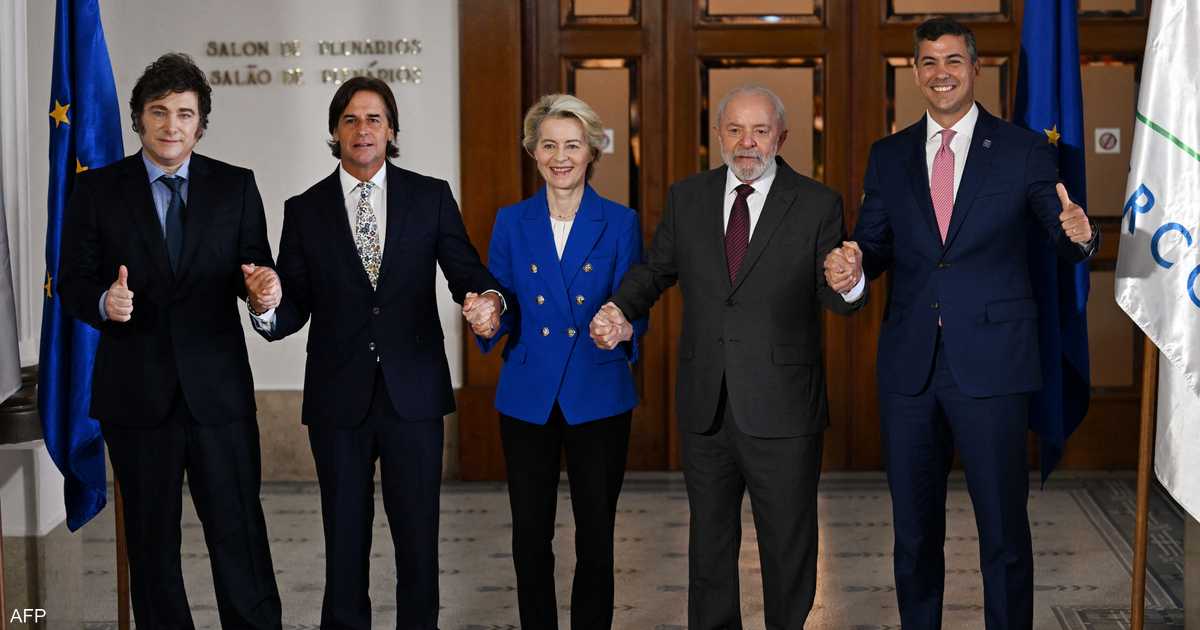Physical Address
304 North Cardinal St.
Dorchester Center, MA 02124


European Commission President Ursula von der Leyen said “it is the beginning of a new story” with “an agreement that will benefit both parties” and “bring significant benefits to consumers and businesses” if ratified.
Von der Leyen’s statements came during a joint press conference with the presidents Argentina andBrazil Paraguay and Uruguay to announce agreement reached after 25 years of talks.
Von der Leyen said the “concerns of our farmers” had been taken into account and that “this agreement includes strong guarantees to protect our livelihoods”.
But for France, the leader of countries opposing the deal in defense of farmers who fear unfair competition from Brazil’s giant farms, “it is clearly not the end of the story,” said outgoing French government foreign trade minister Sophie Primas.
The minister continued in a statement to Agence France-Presse: “This is not the signing of an agreement, but only a political achievement of the negotiations. It is binding only for the Commission, not for the member states.”
In Paris, the French presidency confirmed that the agreement reached “remains unacceptable” and announced that “the Commission has completed its work in terms of negotiations with… MercosurIt is her responsibility, but the agreement has not been signed or concluded, so this is not the end of the story.
A statement from the coalition of the majority unions in the French agricultural sector, FNSEA-JA, which has intensified protest movements in recent weeks, said: “This approval is not only a provocation against European farmers who apply the highest standards of production in the world, but also a denial of democracy, while a huge the majority of our French parliamentarians expressed opposition to this agreement.
The coalition felt that “von der Leyen has betrayed European farmers”.
The European Organization of Agricultural Trade Unions (Copa-Cogeca) believes that this agreement sends a “pernicious message to millions of European farmers”. The organization called on “Member States and the European Parliament to mobilize against this agreement”, which will “worsen the economic pressures on many farms”.
Unacceptable minority
The draft agreement, which has been under discussion since 1999, aims to eliminate most tariffs between the European Union and Mercosur in order to establish a broad market involving more than 700 million consumers. Von der Leyen said it was “the biggest trade and investment partnership ever. Both regions will benefit from it.”
German Chancellor Olaf Schulz, who supported von der Leyen’s trip to Uruguay to open up new market perspectives for his country’s industry, emphasized that “a big obstacle has been removed” and that “there is now a political agreement (…)”. which will enable “greater growth and competitiveness”.
Spanish Prime Minister Pedro Sánchez, who is also a big proponent of opening new economic horizons with “sister Latin American countries”, welcomed the “historic agreement” establishing an “unprecedented economic bridge between Europe and Latin America”.
Sánchez emphasized that “Spain will work to ensure that the majority in the European Council approves this agreement”.
According to the European treaties, the Commission is the sole negotiator in trade agreements on behalf of the 27 member states of the European Union, but any text reached with Mercosur countries must be ratified with the approval of at least 15 member states, representing 65 percent of the population of the European Union, then by obtaining the approval of a majority of the members of the European Parliament. .
An objecting minority could also derail the treaty’s ratification. This is what French President Emmanuel Macron is looking for, who has “reaffirmed” Von der Leyen that the draft trade agreement is “unacceptable in its current form” and will continue to “tirelessly defend our agricultural sovereignty”, according to Elysée.
Italy recently joined the opposition front, after Polish Prime Minister Donald Tusk confirmed at the end of November that he would not accept the draft agreement “according to this formula”. Italian government sources said Thursday that “no conditions are available to sign the current text,” adding that Rome is calling for changes to the text to ensure greater protection for Europe’s agricultural sector.
Opposition is not limited to these three countries Austria and the Netherlands have expressed concern about the agreement, which could also apply to Ireland.
In order to prevent the adoption of the agreement, it is necessary France For three other countries representing more than 35 percent of the European Union’s population, a threshold that can easily be crossed if Rome and Warsaw are confirmed to be in line with Paris.